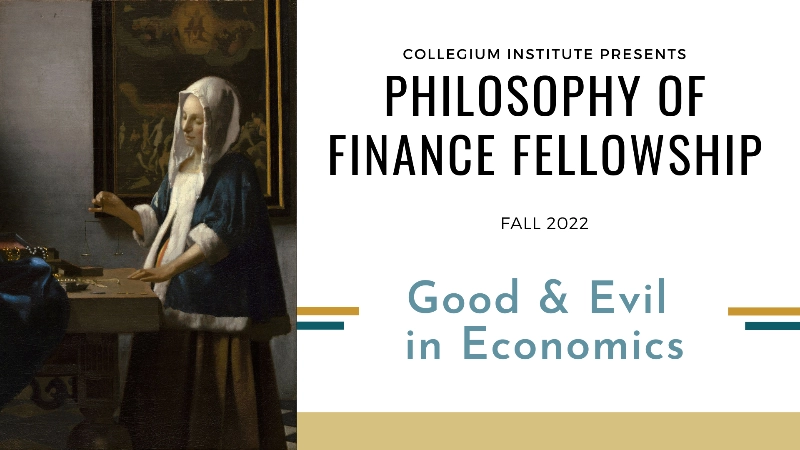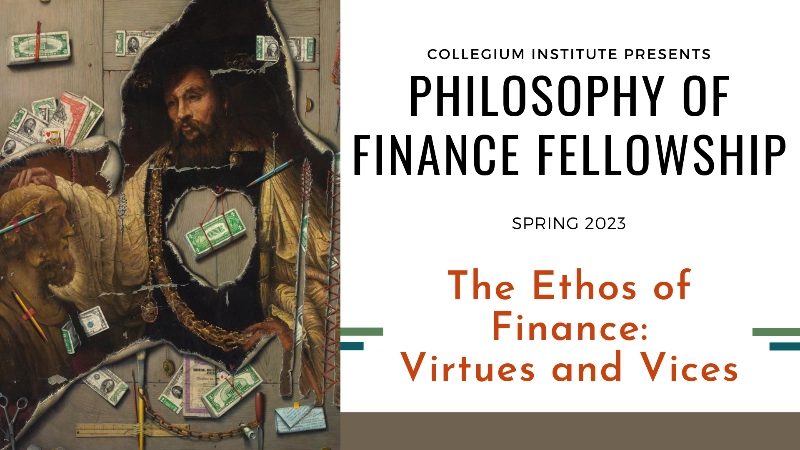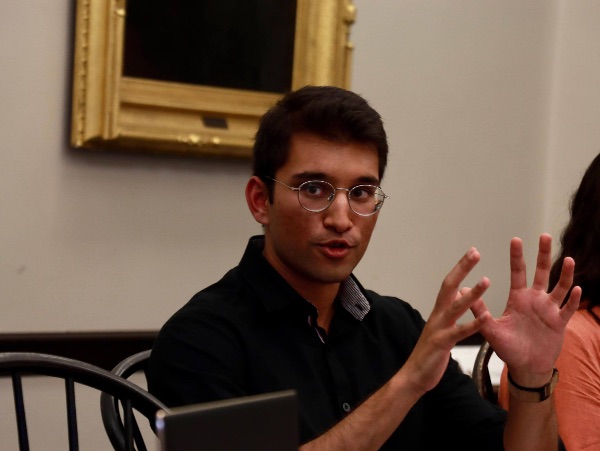Philosophy of Finance Seminars
Dec 26, 2024
These seminars were taught for the Collegium Institute at the University of Pennsylvania, becoming the most attended among the Professions and the Good Life series.
Course Reviews

Fall 2022 Syllabus

The Philosophy of Finance fall semester reflects on good and evil in the market through the lens of human history. Our first meeting introduces the key idea driving our inquiry: modern economic thought emerges from a confluence of enduring stories and myths held by our predecessors. Before discussing the means of economic progress in the spring semester, we consider the ends which the market serves. As such, our fall sessions explore ideas expressed in Mesopotamian, Jewish, and Christian thought, as well as philosophical perspectives on money.
- Introduction, “The Story of Economics: From Poetry to Science” by Tomáš Sedláček, The Economics of Good and Evil (2011)
- “Economic Possibilities for our Grandchildren” (1930) by John Maynard Keynes
Chapter 1, “The Epic of Gilgamesh On Effectiveness, Immortality, and the Economics of Friendship” by Tomáš Sedláček, The Economics of Good and Evil (2011)
Chapter 2, “The Old Testament Earthliness and Goodness” by Tomáš Sedláček, The Economics of Good and Evil (2011)
- “Bernard Mandeville’s Beehive of Vice” by Tomáš Sedláček, The Economics of Good and Evil (2011)
- “Life in the Market is Good For You” (2010) by Deirdre McCloskey
- “Christianity: Spirituality in the Material World” by Tomáš Sedláček, The Economics of Good and Evil (2011)
- “The Starting Point: the Gospels” by Pierre de Lauzun, Finance: A Christian Perspective (2021)
“Money, Finance and Morality in a Global Economy” by Catherine Cowley, New Blackfriars, Vol. 86, No. 1002 (March 2005), pp. 216-227
“Reflection on the Financial Crisis: Aquinas on the Proper Role of Finance” by Mary L. Hirschfeld, Journal of the Society of Christian Ethics, Vol. 35, No. 1 (2015), pp. 63-82
Spring 2023 Syllabus

In this course, we consider the role finance plays in supporting (or undermining) the common good. We also take a look at the 2008 financial crisis and assess the extent to which epistemic vices (incompetence, financial illiteracy) were responsible, as opposed to greed or appetite for risk. Other topics include medieval debates on usury, perspectives on debt accumulation, and financial exclusion.
“The Logic and Function of Finance” by Pierre de Lauzun, Finance: A Christian Perspective (2021)
“Introduction” by Boudewijn de Bruin, Ethics and the Global Financial Crisis: Why Incompetence is Worse than Greed (2014)
- “Case Study I: primes and subprimes” by Boudewijn de Bruin, Ethics and the Global Financial Crisis: Why Incompetence is Worse than Greed (2014)
- “Case Study II: nerds and quants” by Boudewijn de Bruin, Ethics and the Global Financial Crisis: Why Incompetence is Worse than Greed (2014)
“Sustainable Finance and Responsible Investors” by Boudewijn de Bruin, The Business of Liberty: Freedom and Information in Ethics, Politics, and Law (2022)
“The Medieval Origins of the Financial Revolution: Usury, Rentes, and Negotiability” by John H. Munro, The International History Review, Vol. 25, No. 3 (2003), pp. 505-562
“Usury and Just Compensation: Religious and Financial Ethics in Historical Perspective” by Constant Mews and Ibraham Abraham, Journal of Business Ethics Vol. 72 (2007), pp. 1–15




